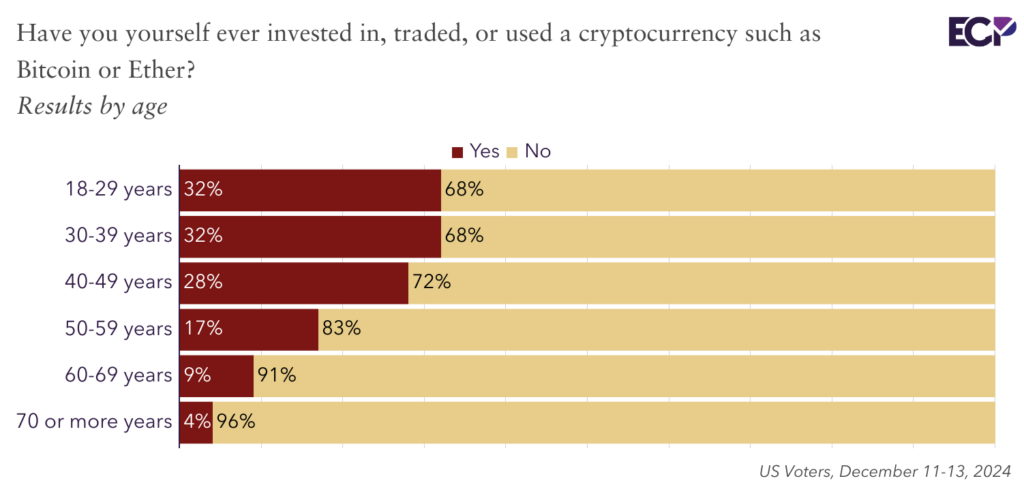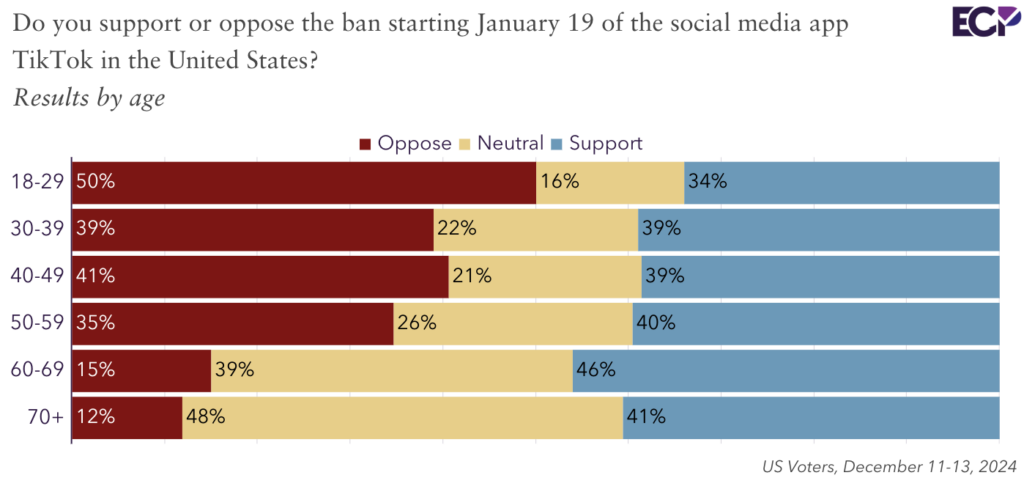Crypto Users Shape U.S. Political Landscape
Crypto Users– A recent Emerson College poll reveals that around 19% of U.S. voters have engaged with cryptocurrencies, whether through investment, trading, or usage. The poll, conducted between December 11 and December 13, surveyed 1,000 registered voters and highlights a significant shift in voter behavior, with crypto users increasingly becoming a key demographic in political discussions.
19% of U.S. Voters Have Used or Invested in Crypto
The December 17 data from Emerson College’s survey shows that almost one in five U.S. voters have interacted with cryptocurrency at some point. Of those respondents who use crypto, almost 40% reported having used it for purchases. This shows a growing integration of digital currencies into everyday transactions and highlights their role as an emerging financial tool for a significant portion of the population.
Younger Voters and Minorities Lead Crypto Adoption
The poll results underscore that younger and more diverse groups are the primary adopters of cryptocurrency. Among crypto users, 57% have a favorable view of Donald Trump, as pointed out by Spencer Kimball, executive director of Emerson College polling. This demographic shift indicates that the crypto user base is an increasingly important group for political campaigns, especially as crypto policies gain traction in U.S. politics.
Kimball noted that voters under the age of 40 represent the largest segment of crypto users, with nearly a third reporting having used cryptocurrencies. In contrast, the percentage of crypto users drops with age—28% of voters in their 40s, 17% in their 50s, 9% in their 60s, and just 4% over the age of 70.

Gender and Racial Demographics of Crypto Users
The survey also found notable gender and racial disparities in crypto usage. Men are twice as likely to use cryptocurrencies as women, with 26% of male respondents and 13% of female respondents reporting use of crypto. Additionally, the crypto user base is more racially diverse, with about a third of crypto users identifying as Asian, Hispanic, or Black, compared to only 14% of White respondents.
Political Implications: Crypto Voters and Policy Preferences
One of the key findings of the Emerson College survey is the political alignment of crypto users. As crypto becomes a larger part of financial and social discourse, the voting bloc associated with it is growing in influence. The survey shows that younger voters, particularly those under 40, are more inclined to support pro-crypto policies, with many viewing it as a vital issue when considering political candidates.

The survey also showed that 40% of voters supported a ban on the social media platform TikTok, although opposition to this view was stronger among voters under 29 years old.
The Rise of the Crypto Voting Bloc
According to another survey by the Digital Chamber, a crypto advocacy group, around 26 million U.S. voters now belong to what is termed the “crypto voting bloc.” This group views pro-crypto policies as a key factor in their voting decisions. About 16% of respondents stated that crypto issues were “extremely” or “very” important in deciding who they would vote for in the 2024 presidential election.
Market research by Grayscale further reinforces the importance of crypto in the political arena. Their findings suggest that over half of U.S. voters are more likely to vote for a candidate with pro-crypto policies, signaling that candidates who embrace cryptocurrency could gain significant support in the upcoming election.
Pro-Crypto Candidates Gaining Ground
Following the 2024 presidential election, there is strong anticipation that pro-crypto candidates will secure seats in Congress. Many industry leaders have speculated that the U.S. government could shift towards becoming the most crypto-friendly administration in history. This potential change could result in a more favorable regulatory environment for digital assets, fostering further growth in the cryptocurrency industry.
As cryptocurrencies continue to grow in popularity and become a mainstream financial tool, political candidates will likely continue to adjust their platforms to address the concerns and preferences of the crypto-using demographic. With crypto’s growing influence, 2025 and beyond could see more robust crypto legislation and policies that could shape the future of the digital economy.
Disclaimer: This article is for informational purposes only and does not constitute investment advice. Cryptocurrencies and stocks, particularly in micro-cap companies, are subject to significant volatility and risk. Please conduct thorough research before making any investment decisions.















Leave a comment